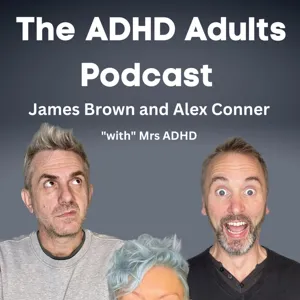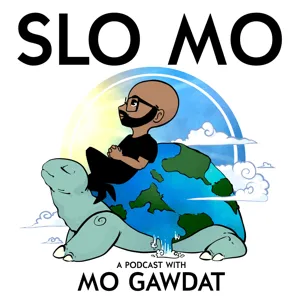Podcast Summary
Earning cashback with Apple Card and discovering new opportunities: Apple Card offers daily cash rewards, Airbnb hosts can earn income, and acknowledging and processing uncomfortable emotions leads to personal growth
There are various ways to earn cashback rewards with the Apple Card and discover new opportunities. Apple Card offers daily cash rewards of up to 3% on purchases, while Airbnb hosts can earn potential income by renting out their homes. Additionally, Express Employment Professionals can help job seekers find employment in any industry. On a deeper level, acknowledging and addressing uncomfortable emotions, particularly grief, can lead to personal growth and resilience. As psychotherapist Julia Samuel notes, suppressing feelings and avoiding the pain of grief can be ineffective. Instead, it's essential to allow the emotions to come through and process them to move forward.
Embrace the reality of loss and develop a relationship with the deceased: Acknowledging and embracing grief leads to healing and growth, while forgetting and moving on is not healthy. Develop a relationship with the deceased by oscillating between moments of connection and memories, allowing all emotions, and continuing to love and be connected.
Effective coping with grief involves acknowledging and embracing the reality of loss, rather than trying to protect ourselves with euphemisms or denial. Julia, a psychologist who has dedicated her career to helping people navigate grief, emphasizes the importance of developing a relationship with the person who has passed away. This means oscillating between moments of connection and memories, and allowing ourselves to feel the full range of emotions, while also moving forward with our lives. Grief can last a long time, but having touchstones to memories and feelings can help us continue to love and be connected to the person, even as we live and love again. Contrary to older attitudes, forgetting and moving on is not the healthiest approach. Instead, acknowledging and embracing grief can lead to healing and growth.
Understanding the Complexity of Grief: Grief is a natural process of healing from loss, but cultural attitudes and denial can make it more difficult and prolonged. Embrace the complexity of grief to adapt and heal.
Grief is a complex and subjective emotional experience that arises from any significant loss, be it the death of a loved one or other life changes. It's a messy and unpredictable process that brings up a range of competing feelings, including sadness, anger, and fear. The natural grieving process is essential for healing and adapting to the reality of the loss, but cultural attitudes towards death and denial of its inevitability can make the process more difficult and prolonged. The pain of grief serves as a catalyst for change, but blocking this natural process can lead to complicated or prolonged grieving. Embracing the complexity of grief and allowing the pain to come through can help us adapt and heal.
The Denial of Death and Grief in Modern Society: Embracing the reality of death and mourning is crucial for mental health. Victorian era's open acknowledgement of death contrasts modern society's discomfort. Explore ways to earn extra income, like hosting on Airbnb or seeking job assistance from Express Employment Professionals. Prepare for the solar eclipse trip with the speaker's friends.
Our cultural taboo around death and grief makes it more difficult for us to handle. According to psychotherapist and bestselling author Julia Samuel, this denial of death, which began with medicine and the First World War, has made us uncomfortable with the idea of death and mourning. In contrast, during the Victorian era, death was more openly acknowledged and accepted as part of life. Samuel suggests that facing the reality of death, both for ourselves and for those we love, is essential for our mental health. Meanwhile, on a lighter note, we learned about various ways to earn extra money, such as becoming an Airbnb host or turning to Express Employment Professionals for job assistance. And, if you're planning a trip to see the solar eclipse, be sure to join the speaker and their friends in April!
Fear of death and unresolved conversations: The fear of death can prevent important conversations about fears, beliefs, and end-of-life preferences, leading to unnecessary suffering and rumination for all involved. Open and honest communication can bring peace and understanding.
The fear of death and the inability to confront it can lead to unresolved issues and difficult conversations, especially for those facing terminal illnesses. This can result in a lack of important conversations about fears, beliefs, and end-of-life preferences, which can cause unnecessary suffering and rumination for both the person facing death and their loved ones. The common belief that grief follows a linear, step-by-step process, such as the five stages proposed by Elisabeth Kübler-Ross, can add to the pressure to conform and control the grieving process, rather than allowing natural and complex emotions to be experienced. Instead, open and honest communication about fears, values, and end-of-life wishes can bring peace and understanding to all involved.
Grief is deeply embodied: Recognizing grief's physical symptoms can help us approach it with compassion and take practical steps to support our well-being
Grief is a deeply embodied experience, rooted in our physiology and our nervous system. When we face a significant loss, our body goes into a state of heightened alertness, similar to the "fight, flight or freeze" response. This response can leave us feeling physically and emotionally drained, with symptoms like shortness of breath, loss of appetite, insomnia, and a feeling of being "brokenhearted." These symptoms are not just metaphors, but real physiological responses to the perceived threat of loss. Recognizing the embodied nature of grief can help us approach it with more patience and compassion, and take practical steps to support our physical and emotional well-being, such as exercise, getting outside, journaling, and seeking social support. By acknowledging and addressing the body's role in grief, we can begin to heal and integrate our mind, body, and heart.
Facing Challenges and Embracing the Uncertainty of Life: Embracing challenges and uncertainty can lead to personal growth and happiness. Whether it's dealing with grief or trying new experiences, facing fears and accepting impermanence can bring joy and self-discovery.
Embracing challenges and accepting the uncertainty of life, whether it's grief or traveling, can lead to personal growth and happiness. Julia Samuel emphasizes the paradox of grief, encouraging us to face our fears and embrace the impermanence of life. Meanwhile, traveling, like staying in an Airbnb or finding a job, can provide new experiences and opportunities. Additionally, Express Employment Professionals offers free job assistance for those seeking employment. San Diego, with its sunny weather and welcoming atmosphere, is another reminder to take time for self-care and rejuvenation. Overall, the message is to face challenges with courage, accept the unknown, and make the most of the time we have.
Understanding Emotions: Signals for Growth and Adaptation: Emotions are essential signals for growth and adaptation, and suppressing them can lead to increased intensity. Acknowledge and express emotions to incrementally adapt and shift, ultimately changing and growing from the experience.
Emotions, including negative ones like grief, are not inherently good or bad. Instead, they are important signals and part of the human experience. Trying to suppress emotions, such as sadness, fear, or anger, can be counterproductive and may lead to increased intensity. It's essential to allow emotions to express themselves and face them, as doing so can lead to growth and adaptation. The analogy of a pressure cooker is useful in understanding this concept, as emotions are like tornadoes in the body, signaling that something significant has happened and urging us to pay attention. By acknowledging and expressing emotions, we can incrementally adapt and shift, ultimately changing and growing from the experience.
Embrace emotions for healing and growth: Acknowledging emotions is essential for healing and growth, even during times of grief. Create intentional spaces for reflection and connection to navigate grief and transform into a new self.
Acknowledging and expressing emotions, even the difficult ones, is essential for healing and growth, especially during times of grief. Busyness and distractions can be natural blockers, but they don't allow us to fully process and move through our emotions. Creating intentional spaces for reflection and connection with loved ones, even in small ways, can help us navigate grief and transform into a new version of ourselves. Society may pressure us to "get over it," but embracing the growth that comes with grief can lead to expanded perception, increased resilience, and a deeper appreciation for life. The paradox is that what we need to heal is to be with our emotions, not avoid them.
Navigating the Grieving Process and Supporting Mental Wellness: Grieving is a necessary process for internal growth, but it's not easy. Support from loved ones, physical health, mental wellness, and tools like Canva and BetterHelp can help navigate this challenging time.
While we may resist the feelings of grief and wish to avoid them, internal growth can only occur once we allow ourselves to experience and process these emotions. This paradoxical aspect of grief is not easy to accept, but with the right support, it is possible to navigate the grieving process. In part 2 of the conversation with grief expert Julia Samuel, listeners will learn about various strategies to help support themselves during this challenging time. Moreover, the importance of both physical health and mental wellness in promoting happiness is emphasized. A place like San Diego, with its sunny weather, welcoming people, and beautiful scenery, can offer an ideal environment for rest, recharge, and reinvigoration. Additionally, technology tools like Canva presentations can help enhance work presentations with AI-powered assistance, enabling users to focus on their content without having to switch between applications. Lastly, BetterHelp, an online therapy platform, offers accessible and affordable mental health support, making it an essential resource for managing mental health challenges.






